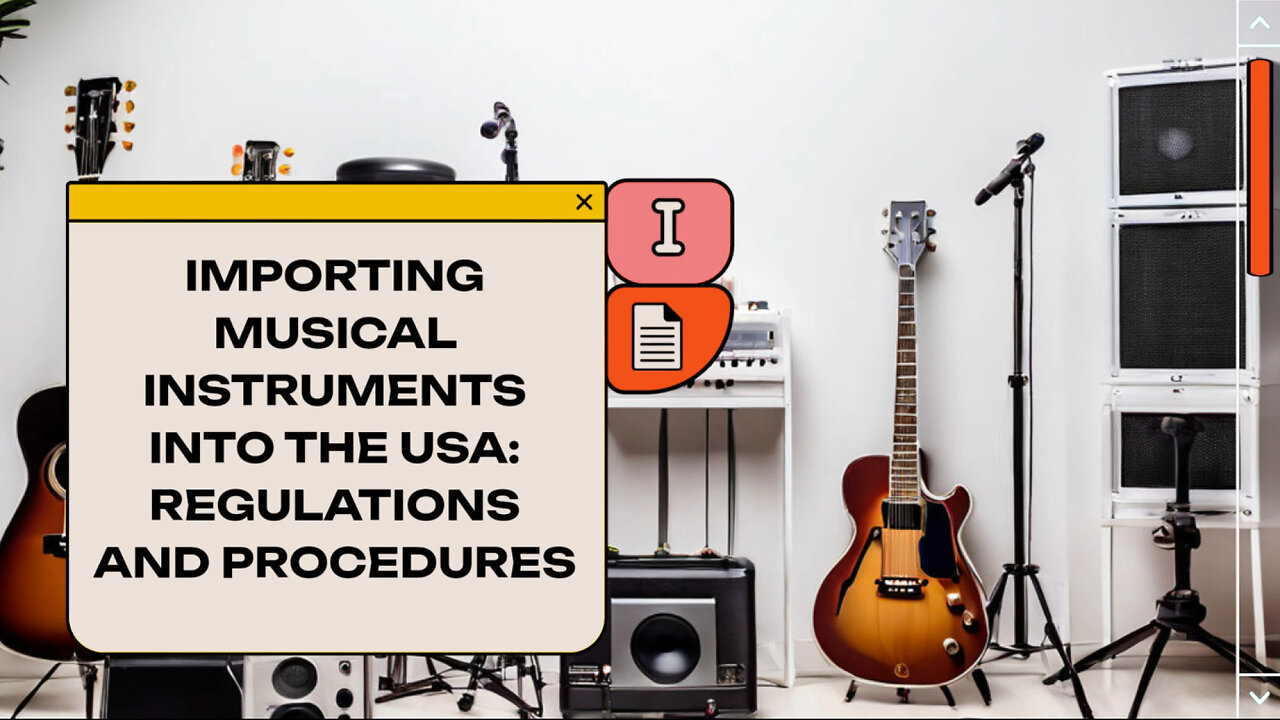Premium Only Content

Importing Musical Instruments: Navigating the Harmonious Process into the USA
ISF Template | 562-453-7357 | [email protected] | www.isftemplate.com
Importing musical instruments, sheet music, and books into the USA involves specific regulations and procedures that must be followed. This includes filing an Importer Security Filing (ISF) or 10+2 rule, which provides important cargo information to US Customs and Border Protection (CBP) prior to the vessel's departure. A customs bond is also required to ensure the payment of duties, taxes, and compliance with regulations. Certain musical instruments may require permits or licenses from other government agencies. Once the shipment arrives, it goes through customs clearance, which may involve a physical examination by CBP. Working with an experienced customs broker is crucial for a smooth process. Compliance with regulations is essential to avoid delays or penalties.
Keywords: importing, musical instruments, sheet music, books, USA, regulations, procedures, ISF, customs bond, licenses, permits, customs clearance, physical examination, customs broker, compliance
#usimportbond
#isfcustomsbroker
#uscustomsclearing
#isfentry
Video Disclaimer Here: This video is designed for education and is unaffiliated with US government bodies.
0:31 - Importing musical instruments, sheet music, and books into the USA involves specific regulations and procedures, including the mandatory filing of an Importer Security Filing (ISF) or the 10+2 rule for ocean shipments.
1:19 - A customs bond is another essential aspect of the importing process, serving as a financial guarantee between the importer, surety company, and US Customs and Border Protection (CBP) to ensure compliance with duties, taxes, and regulations.
1:48 - Some musical instruments may require specific licenses or permits from government agencies like the Department of Agriculture or the Fish and Wildlife Service, especially if they are made from protected wood species.
2:16 - After arrival in the USA, the imported shipment goes through customs clearance, where CBP may conduct a physical examination to verify compliance with regulations, contents, and value before releasing the shipment.
2:46 - Working with a reliable customs brokerage firm experienced in handling musical instrument imports is crucial for a smooth and hassle-free process. Compliance with regulations, obtaining necessary permits, and ensuring proper documentation are key to avoiding delays or penalties.
-
 LIVE
LIVE
Barry Cunningham
3 hours agoBREAKING NEWS: COUNTDOWN TO COMMUNISM! ELECTION RESULTS SHOW!
1,672 watching -
 2:11:28
2:11:28
DeVory Darkins
3 hours agoLIVE NOW: 2025 Election results and Exit Polls AMA
19.5K22 -
 LIVE
LIVE
DLDAfterDark
2 hours agoJust Another Tuesday - In Virginia - The Governor's Race & Glock Talk
102 watching -
 3:21:38
3:21:38
The Charlie Kirk Show
5 hours agoJUDGMENT DAY 2025: The Election Results Stream
143K70 -
 3:51:07
3:51:07
MattMorseTV
6 hours ago $0.69 earned🔴Election Day LIVE COVERAGE.🔴
67.2K39 -

Flyover Conservatives
22 hours agoSHOCKING DATA REVEALS: Young Voters Are Done With the Old GOP - Mark Mitchell, Rasmussen Reports | FOC Show
14K14 -
 1:15:28
1:15:28
Sarah Westall
5 hours agoGrooming is Protected and Encouraged by the System – Michelle Peterson and Mike Adamovich
15.6K4 -
 LIVE
LIVE
Akademiks
2 hours agoKendrick tries to Flip the Bots on DRAKE? WHo Beats Jay z in a verzuz. Blueface finally free!
1,013 watching -
 1:38:16
1:38:16
Professor Nez
8 hours ago🚨ELECTION NIGHT 2025 LIVE! Massive Upsets Brewing in New York, New Jersey & Virginia!
22.9K9 -
 LIVE
LIVE
Due Dissidence
11 hours agoLIVE: ELECTION RESULTS From NYC, NJ, and VA - Trump Approval CRATERS, Kash's Private Jet CRASH OUT
985 watching